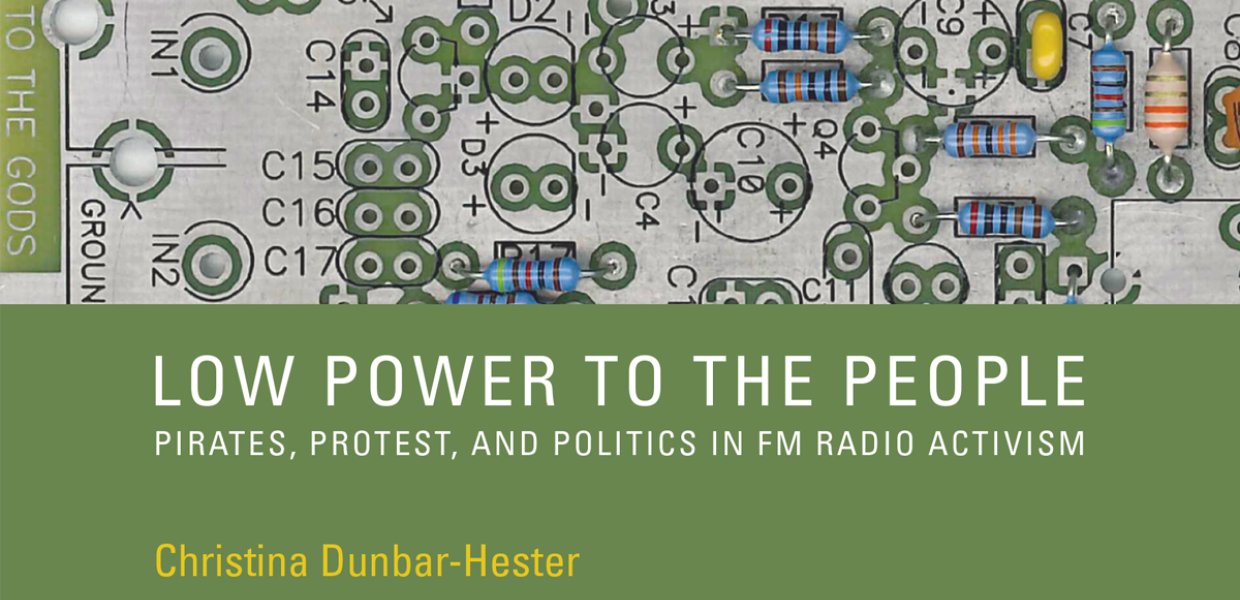Professor Christina Dunbar-Hester was recently awarded the 2014 McGannon Book Award for her book, "Low Power to the People: Pirates, Protest, and Politics in FM Radio Activism" (MIT Press, 2014).
The award is given annually by the McGannon Center at Fordham University, where Dunbar-Hester was previously a Visiting Fellow. The McGannon Center “promotes research on communication and democratic values,” said Dunbar-Hester. “I was also interested in aspects of policy […] but from a more social or cultural perspective.”
In 2000, the FCC introduced the Low Power FM radio service, which gave community groups their first opportunity to legally broadcast in twenty years. In "Low Power to the People," Dunbar-Hester followed a Philadelphia-based non-profit activist group, the Prometheus Radio Project, as they worked to bring low power FM radio stations, or LPFM, to local groups across the United States.
Dunbar-Hester, who researches technology in society, was drawn to Prometheus as an intersection of activism and technology.
“Why,” she asked, “did activists think access to media technology was such an important issue for social justice activism?”
The Prometheus Radio Project's fight was never “just about radio.” They didn’t focus solely on the technology itself, but on the way the particular technology aligned with their own values as activists.
“An important aspect of their activism was articulating values around low power FM broadcasting—such as noncommercial status, control/ownership ‘by the people,’ and having a use in political organizing,” said Dunbar-Hester.
While the Prometheus Project wasn’t dismissive of the Internet, the group was cautious, Dunbar-Hester said. After all, it wasn’t—and isn’t—clear that “digital media” offers users the kind of deep-rooted control that low power FM broadcasting does.
“In a sense, one of the most powerful aspects of LPFM is its symbolic dimension—these stations cover only a tiny range, and the material effect is micro-scale (even if very valued in a local community)—but LPFMs represent a space in the media landscape that is pretty unique in that they are truly independent and their use is determined by the group of folks who hold any given license.”
While current discussions of activism and technology often center on Internet-based social media, like Twitter, Dunbar-Hester points out that those platforms don’t necessarily line up with deeply-held activist views.
“A lot of spaces online that we treat like they are our commons, such as social media platforms, are actually controlled by companies whose goals may diverge from those of users,” she said.
Low power FM stations, by contrast, are owned and operated by small community organizations. While they don’t have the global reach of something posted online, they can be critical for groups on a local level. And fifteen years after LPFMs were introduced by the FCC, the Prometheus Radio Project continues to provide support for community-based stations.
In a world where radio can seem old fashioned, Dunbar-Hester makes the point that “a collective focus on novelty and ‘innovation’ leaves us with a blind spot about the fact that in reality, there is a rich interplay between ‘old’ and ‘new’ that is more interesting, and more challenging to understand.”
Dunbar-Hester brings the intersection of culture and tech to her work with students, as well. “I try to introduce students to a framework and vocabulary for understanding how technological artifacts and systems embody assumptions and values of the culture that produces them,” she said.
